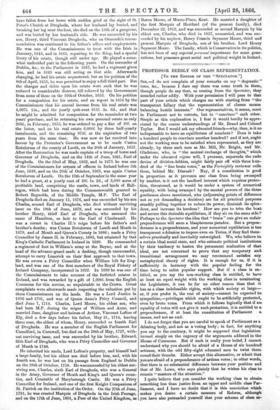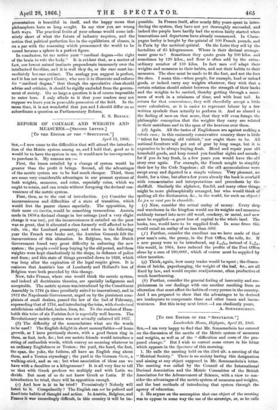PROFESSOR BEESLY ON CLASS REPRESENTATION. [To THE EDITOR OF THE
"SPECTATOR."]
SIR,-I do not complain of your remarks on my " dogmatic " tone, &c., because I dare say there was some truth in them, though people do say that, as coming from the Spectator, they sounded rather oddly. With your permission I will pass to that part of your article which charges me with starting from "the transparent fallacy that the representation of classes means balancing hostile interests." Our representatives, it seems, meet. in Parliament not to outvote, but to " convince " each other. Simple as this explanation is, I fear it would hardly be appre- ciated by the coarse understandings of Mr. Brand and Colonel Taylor. But I would ask my educated friends—why, then, is it so indispensable to have an equilibrium of numbers ? Does it take- a hundred people to convince another hundred? and if not, ought. not the working men to be satisfied when represented, as they are already, by three such men as Mr. Mill, Mr. Bright, and Mr. Gladstone, who, in " the mutual exchange of thoughts," which. under the educated regime will, I presume, supersede the rude device of division-lobbies, might fairly pair off with three hun- dred of the " fine brute votes," as the Fortnightly reviewer calls. them, behind Mr. Disraeli? Nay, if a constitution is good in proportion as it prevents one class from being swamped; by another, is it not the landlord interest which requires protec- tion, threatened, as it would be under a system of numerical equality, with being swampel by the mental powers of the three gentlemen above mentioned, who (adjourning points of difference- not as yet demanding a decision) are for all practical purpose& steadily pulling together to reduce its power, diminish its splen- dour, and increase its burdens? How are you to trim the boat. and secure this desirable equilibrium, if they sit on the same side? Perhaps to the Spectator the idea that " brain " can give an unfair- preponderance will seem a blasphemous paradox. But a prepon- derance is a preponderance, and your numerical equilibrium is too transparent a delusion to impose even on Tories, if they find them- selves practically and inevitably outweighed. We, who believe in a certain ideal social state, and who estimate political institutions. by their tendency to hasten the permanent realization of that ideal, are not concerned to prove that any temporary an& transitional arrangement we may recommend satisfies any metaphysical theory of rights. It is enough for us, if it is sufficiently in harmony with the popular feeling for the time being to enlist popular support. But if a class is en- titled, as you say the non-working class is entitled, to have- at least an equal weight with the working class in nominating the Legislature, it can be for no other reason than that it has as a class indefeasible rights, with which society at large— or, if you prefer it, the rest of society—cannot be expected to. sympathize,—privileges which ought to be artificially protected, even by brute votes. From which it follows logically that if an. equality of votes will not give it such protection, it is entitled to a. preponderance, if at least the constitution of Parliament a- means, and not an end.
I do not forget that you are careful to speak of Parliament as a debating body, and not as a voting body ; in fact, for anything you say to the contrary, it might be supposed that legislation turned simply on the cogency of the arguments adduced in the House of Commons. But if such is really your belief, I cannot understand why you should be afraid of a House of six hundreffi artizans, with the odd fifty-eight educated men to twist them, round their thumbs. Either accept this alternative, or admit that you are afraid of a preponderance of artizan votes ; in other words, that there is no substantial difference between your position and that of Mr. Lowe, who says plainly that he wishes his class to remain " masters of the situation."
I quite believe that you consider the working class to obtain, something less than justice from an upper and middle class Par- liament, and I have no doubt that it is this conviction which makes you desire a certain measure of Reform, although you have also persuaded yourself that your scheme of class re-
presentation is beautiful in itself, and the happy mean that philosophers have so long sought. In my view you are wrong both ways. The practical fruits of your scheme would come infi- nitely short of what the future of industry requires, and the notion that political perfection lies in the equilibrium of classes, is on a par with the reasoning which pronounced the world to be round because a sphere is a perfect figure.
In conclusion, let me notice your " cardinal dogma—the right of the brain to rule the body." It is evident that, as a matter of fact, our lowest animal instincts preponderate immensely over the intellectual faculties, and it is well they do, or the race must im- mediately become extinct. The analogy you suggest is perfect, and it has not escape.' Comte, who uses it to illustrate and enforce his "cardinal dogma," that though the speculative class should advise and criticize, it should be rigidly excluded from the govern- ment of society. On so large a question it is of course impossible to enter here. I only allude to it that your readers may not suppose we leave you in peaceable possession of the field. In the mean time, it is not wonderful that you and I should differ on so subordinate a question as Parliamentary Reform.
E. S. BEESLY.































 Previous page
Previous page